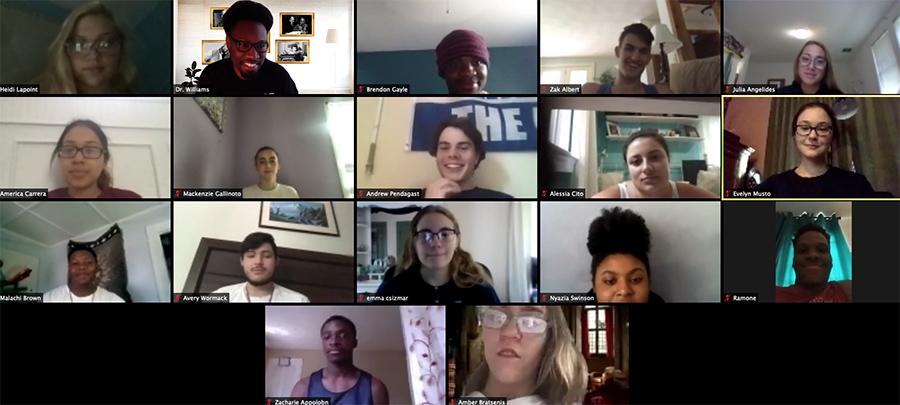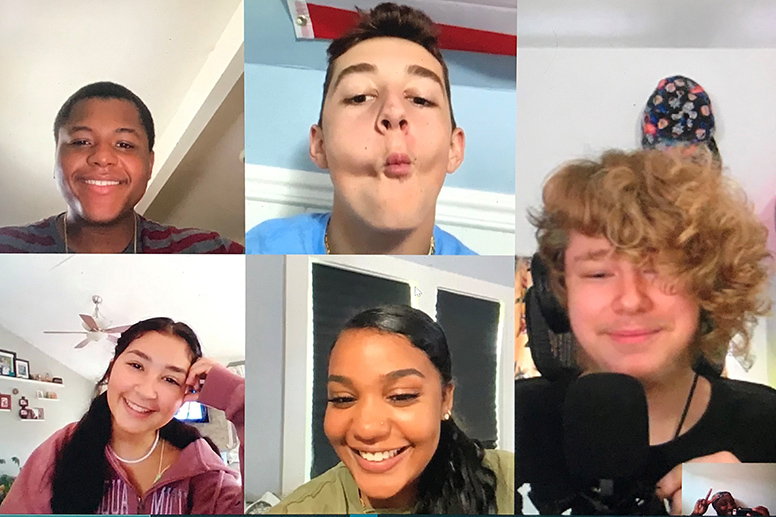- Apply
- Visit
- Request Info
- Give



Published on July 30, 2020

More than 80 prospective students are currently vying for admission to Eastern Connecticut State University this summer through the alternative admissions program known as “STEP/CAP” — Summer Transition at Eastern Program/Contract Admissions Program. For 36 consecutive years, STEP/CAP has given first-generation students or those facing socioeconomic barriers the opportunity to enroll at Eastern upon successful completion of the summer program.
The six-week program is traditionally held on campus, where participating students live in residence halls and take a variety of classes designed to bolster their writing, mathematics, communication and study skills. An overall 2.5 GPA upon conclusion of the program grants students admission to the university in the fall semester.
For the first time in the program’s history, STEP/CAP has been reengineered in a virtual format in response to the coronavirus pandemic. “It’s been a huge undertaking to convert this program (to the online format),” said Maribel Sanchez, STEP/CAP advisor. “The residential aspect was one of the biggest pieces… the students acclimating to campus, waking up early for classes, interacting with professors… But they’ve responded well to this temporary way of things, and the faculty are working hard (to relate) things to how they’ll be on campus.”
This year’s program consists of five groups of 15–18 students who are taking one of five First Year Introduction courses (FYI 100), as well as sessions geared toward study skills and college success. For six weeks, the Monday-through-Thursday schedule utilizes a blend of video-based group and one-on-one sessions.
“The new online learning environment has been both the biggest challenge and our biggest success,” said English Professor Christine Garcia, whose “Inventing the University” course explores the concept of higher education and the “institution of the university.”
“I was worried about being able to create community in an online classroom and about finding ways to make sure everyone had their voice heard,” she said. “Our online class has turned out to be a vibrant and dynamic learning space where conversations, presentations and Q&A happen naturally.”
Theatre Professor Kristen Morgan has also found success in the online format, utilizing all features of Blackboard Collaborate — the online platform that hosts virtual classrooms. Her course, “Ethics of Virtual Worlds,” explores how emerging technologies facilitate or prevent border crossings around the world.
With options for break-out sessions, discussion boards, an annotation tool and chat function, Morgan admits there was a learning curve when adjusting to the new technology. “But it’s working out very well,” she said, and plans to use this format for future classes. “I think students will be very pleased!”
Given the unusual circumstances of the pandemic, Eastern personnel have worked hard to make this virtual edition of STEP/CAP as meaningful as possible. A team of more than 40 faculty members, peer mentors/advisors and support staff are working throughout the week to guide participants through the program.
Chasidy Eubanks-Perry is a current student who also serves as a peer advisor. “We’re not just their advisors,” she said, “but we’re also their role models, people they look up to and seek guidance from… their support system. Every peer advisor chose this position because we all wanted to give back to the people that gave us an opportunity.”
As a STEP/CAP participant in 2017, Eubanks-Perry added, “I can say that if it wasn’t for STEP/CAP and the connections I made, I would not be the person I am today with the opportunities that are forthcoming. I greatly appreciate every person involved — from the students to the staff — they have really paved the way. I also enjoy being a peer advisor because you witness the growth in the students from the first day meeting them to the last. It’s very inspiring to see.”
FYI 100 courses are “writing intensive,” so there is one writing tutor per group, as well as peer mentors who assist with the curriculum of each course. During the study skills sessions, advising staff and peer advisors discuss time management and leadership skills, as well as educate students about campus resources.

“It's an entire village,” said Theatre Professor DeRon Williams, whose course “Diversity & Performance” examines the pervasiveness of performance in social and cultural life. “We work collaboratively to ensure that we are providing the best instruction and support possible,” he said. “For me, this is a significant success and a highlight of the program… coming together as a team to encourage, support and educate these very bright and intelligent students.”
Attending a virtual classroom presents a variety of obstacles nonexistent in the traditional college classroom. From technical issues related to faulty internet connections or finicky cameras, to maintaining proper posture or finding a suitable workspace in one’s home, the challenges are myriad for hopeful college students.
James Holland, theatre and art lecturer, is teaching the FYI course “The Art of Everyday Life,” which focuses on the creativity involved in speech and visual expression and emphasizes that all forms of communication are types of performance. “Meeting exclusively online is a challenge for a class that’s built on direct interaction and grounded in performance,” he said.
But if there’s one thing the students have shown, it’s adaptability. “Having students climb aboard and meet the challenges head on has definitely been encouraging,” said Holland. “Student enthusiasm is absolutely essential, and I've found a lot of enthusiasm in the students I'm working with this summer.”
Students will finally have the opportunity to be on campus in mid-August. Those who graduate from the program will visit campus and personally meet the peers, faculty and staff they’ve virtually worked with for the last two months. Less than two weeks after this visit, they’ll walk the halls and courtyards of Eastern as freshmen when the fall semester opens on Aug. 26.
Written by Michael Rouleau